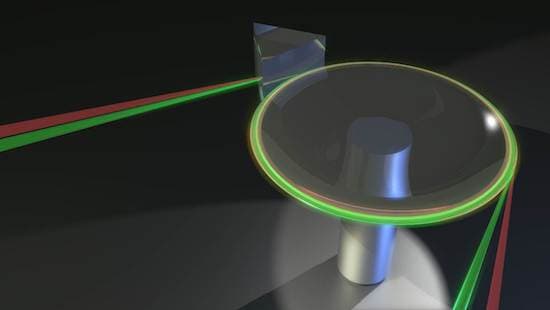World's Most Sensitive Thermometer Uses Light And Is 3x More Precise
How does this all work?
Well the Adelaide research team made use of light to measure temperature. Basically, the the thermometer injects 2 colors of light (red and green) into a highly polished crystalline disk. Depending on the temperature of the crystal, the two colors travelled at somewhat different speeds inside it. After heating the crystal up, the researchers observed that the red light would be slowed than the green light. Later, they forced this light to circulate 1000s of times around the edge of the disk - just the way that sound concentrates and reinforces itself in a curve in a phenomena known as a "whispering gallery." This made them measure this minuscule difference in speed with great precision.

To emphasize on the ingenuity of this concept and demonstrate how precise this new thermometer is, the researchers gave an example of a normal situation when we are testing the temperature of person with fever. We all have experienced that the temperature is always fluctuating. The reason behind is that all the atoms in any material are always in a state of fluctuation. And this is where the newly introduced super sensitive thermometer can play a significant role in measuring the variants in speed of atoms accurately.
The researchers at IPAS are certain that the ability to measure temperature at such a high degree of precision will revolutionize technologies used in industrial and medical applications. Those interested in this research work can take a look at the paper titled 'Nano-Kelvin Thermometry and Temperature Control: Beyond the Thermal Noise Limit' published in <a href="https://journals.aps.org/prl/abstract/10.1103/PhysRevLett.112.160801" target="_blank" rel="noopener noreferrer">403 Forbidden</a>.
What are your thoughts on precision in measurement and the new thermometer? Share with us in comments.
Source: <a href="https://www.adelaide.edu.au/news/news70922.html" target="_blank" rel="noopener noreferrer">World's best thermometer made from light</a>
